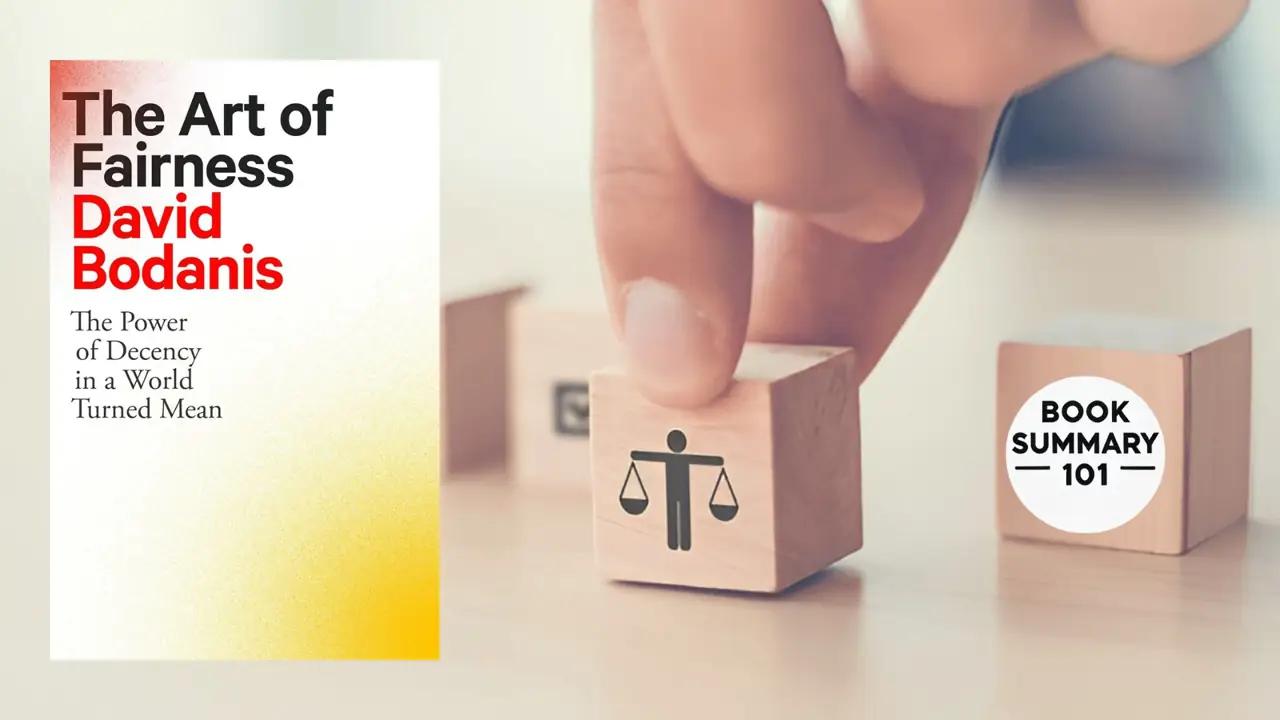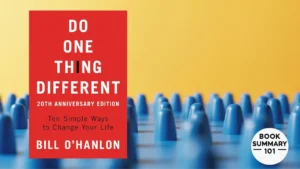In today’s world, it’s easy to think that being ruthless is the only way to succeed. We see it all the time—cutthroat competition, people stepping over each other to climb the ladder, and the idea that “nice guys finish last.” But David Bodanis, in his book The Art of Fairness: The Power of Decency in a World Turned Mean, argues something radically different. What if kindness, fairness, and decency were actually superpowers that help people thrive in the long run?
In this book, Bodanis takes us on a journey through history and around the world to prove that fairness isn’t a weakness; it’s a powerful strategy for success.
Why Read This Book?
Let’s face it: we’re in a world that sometimes feels like it’s running low on kindness. It’s easy to feel that if you want to achieve something great, you need to be aggressive, focus on yourself, and maybe cut a few corners. The Art of Fairness flips this narrative, showing that genuine, lasting success can be built on a foundation of decency. Bodanis dives into the science of fairness, using psychology and real-world stories to show why fairness works and how it can help you create positive change in your own life.
If you’ve ever felt stuck between wanting to succeed and wanting to stay true to yourself, this book is for you. It’s like a blueprint for winning in a way that doesn’t compromise who you are—and that’s something refreshing to read in today’s world.
The book on amazon 👉 The Art of Fairness 📚
How Fairness Actually Works
Bodanis doesn’t just tell us why fairness is important; he also offers actionable advice for using fairness as a strength in our own lives. Here are a few practical takeaways from the book:
✅ Empower Others Without Losing Your Own Strength
Let’s get one thing straight: being fair doesn’t mean you have to roll over and let others walk all over you. Far from it. Real fairness is about strength—the kind that lifts others up without dimming your own light. It’s knowing when to speak and when to listen, when to lead and when to step back.
When you empower others—by inviting ideas, sharing credit, or giving them space to grow—you’re not giving up your power. You’re multiplying it. Fairness, in this sense, is about creating an environment where everyone feels safe to contribute, where egos take a back seat and collaboration takes the wheel. It’s a delicate dance between empathy and assertiveness, and when you strike that balance, magic happens.
People trust you more. They work harder. They take ownership. And ironically? They’ll see you as the strongest one in the room—not because you dominated, but because you made space for others to shine.
👂 Listen Before You Lead
Think about the best leaders you’ve ever known—were they the ones who talked the most, or the ones who really listened? David Bodanis makes it clear: the strongest leaders don’t dominate the room, they tune in. President Franklin D. Roosevelt was a master of this. He didn’t surround himself with “yes men.” Instead, he intentionally brought in people who thought differently, challenged him, and offered new perspectives. And more importantly, he listened to them.
When you take the time to hear people out—genuinely, not just nodding along while waiting to speak—you build trust. And once people trust you, they’ll walk through fire for you. Listening makes people feel seen and valued, and in turn, it gives you the full picture you need to make smarter, more inclusive decisions.
So whether you’re leading a team, managing a project, or just navigating a tricky conversation, try listening first. It’s not just kind—it’s strategic.
🧘♂️ Stay Calm Under Pressure
Fairness isn’t just for the good times—it’s often proven in the tough ones. And few stories show that better than Captain “Sully” Sullenberger’s emergency landing on the Hudson River. Imagine the pressure: both engines fail midair, you’re over one of the busiest cities in the world, and you have just seconds to act. Most people would panic. Sully didn’t.
What made his response so extraordinary wasn’t just technical skill—it was the way he stayed composed, communicated clearly, and trusted his co-pilot and crew. He didn’t bark orders or freeze up. He led with calm, mutual respect, and fairness. Everyone had a role, everyone was heard, and together they pulled off what became known as “The Miracle on the Hudson.”
Bodanis highlights this moment to show that fairness isn’t just a feel-good trait—it’s a practical advantage, especially under pressure. When we stay calm and treat others with respect during a crisis, we make better decisions, keep people engaged, and build the kind of trust that can carry a team through just about anything.
Bottom line: in chaos, fairness can be your superpower.
🎨 Create an Inclusive Environment
If you’ve ever watched a Pixar movie and felt deeply moved—or laughed way harder than you expected—you’ve experienced the magic that happens when creativity and fairness collide. Pixar didn’t become a storytelling powerhouse by keeping creative decisions locked behind closed doors. Instead, they built a culture where everyone’s voice mattered, from veteran animators to first-day interns.
David Bodanis uses Pixar as a shining example of how fairness fuels innovation. One of the company’s most powerful tools is the “Braintrust,” a feedback session where filmmakers at all levels gather to share ideas and critiques freely. There are no egos in the room, no one person’s vision that overrides the rest. The best idea wins, period. That’s what fairness looks like in action.
By making space for different perspectives and encouraging open collaboration, Pixar created some of the most groundbreaking animated films ever made. Think about it—movies like Up and Wall-E were wild ideas on paper. But in an inclusive, fair environment, risky ideas get nurtured instead of shut down.
When you foster that kind of atmosphere—where people feel safe to speak up and contribute—you unlock creativity that can’t be faked. People do their best work when they feel valued, and fairness is the foundation that makes that possible.
🔄 Be Open to Change
One of the biggest myths about strong leadership? That you have to stick to your guns no matter what. But as David Bodanis reminds us, real strength—and real fairness—often looks like flexibility. Fair leaders aren’t rigid. They’re responsive. They know that holding too tightly to “their way” can shut down better ideas and alienate the very people they need on their side.
Being fair means being willing to step back and ask, “Is this still the best path forward—for everyone?” If the answer is no, fair leaders have the humility to pivot. They listen to feedback. They admit when something isn’t working. And they’re not afraid to shift course if it leads to a better, more inclusive outcome.
That kind of adaptability doesn’t just make people feel heard—it builds resilience. It sends the message that what matters isn’t personal pride, but shared progress. And in fast-changing environments (hello, real life), that mindset is absolutely critical.
So whether you’re running a business, managing a team, or just navigating everyday decisions, remember: being fair doesn’t mean sticking to your plan at all costs. It means staying open—because that’s how the best outcomes are made.
Real-Life Examples of Fairness as a Superpower
Bodanis sprinkles the book with real-life stories that make his points come alive. Here are a few memorable examples:
1. President Franklin D. Roosevelt and His Approach to Leadership
Roosevelt was the ultimate leader during a time of extreme crisis—the Great Depression and World War II. Bodanis explains how Roosevelt didn’t rule with an iron fist. Instead, he listened to his advisors, treated people with respect, and created a culture where even opposing voices felt heard. He found strength in fairness, which helped him rally a diverse group of people toward a common goal. His respect for his team wasn’t a weakness; it was the thing that made him one of America’s most effective presidents.
2. Captain Chesley “Sully” Sullenberger and the Miracle on the Hudson
You probably remember the story of Sully Sullenberger, the airline pilot who landed a plane on the Hudson River, saving all 155 passengers. Bodanis highlights how Sully’s approach in the cockpit was calm and collaborative. In the moments before landing, Sully coordinated with his co-pilot, valued every person’s input, and kept his cool under pressure. His decision-making wasn’t driven by ego but by an intense sense of responsibility and fairness toward his passengers and crew. This story shows that being fair and decent doesn’t mean you’re soft; it means you’re strong and capable of making decisions under stress.
3. The Pixar Team and the Creative Process
Pixar is famous for its unique blend of creativity and teamwork, and Bodanis dives into how the studio’s founders created a fair and open environment that became the cornerstone of its success. They believed that everyone on the team—no matter their role—could offer valuable ideas. This fairness encouraged people to share their best work, ultimately leading to some of the most beloved animated films of our time. Pixar’s story is a testament to how fairness in the workplace can lead to incredible innovation and success.
Join the Conversation!
The Art of Fairness gives us a much-needed perspective shift: being fair isn’t a weakness, but a path to stronger, better results. Have you experienced a moment when fairness paid off for you? Or do you have a story of someone in your life who showed strength through kindness?
Let’s keep this conversation going! Leave a comment with your thoughts, and let’s explore together how we can apply these principles in our own lives.
The book on amazon 👉 The Art of Fairness 📚
💬 5 Quotes From The Art of Fairness book:
- “Fairness isn’t about weakness; it’s a form of strength that creates lasting power.”
– A powerful reminder that being decent doesn’t mean you’re soft—it means you’re building something that lasts. - “Kindness, when combined with competence, is a force multiplier.”
– It’s not just about being nice. It’s about pairing fairness with skill to create real impact. - “You don’t have to be ruthless to rise. You just have to be good—and fair—enough for others to want to rise with you.”
– This line really sums up the whole message of the book. Success doesn’t have to be a solo act. - “The most effective leaders don’t demand respect—they earn it, by showing it first.”
– Respect begets respect. Simple as that. - “In a mean world, decency stands out—and that’s what makes it powerful.”
– In times like these, choosing fairness might just be your secret weapon.



